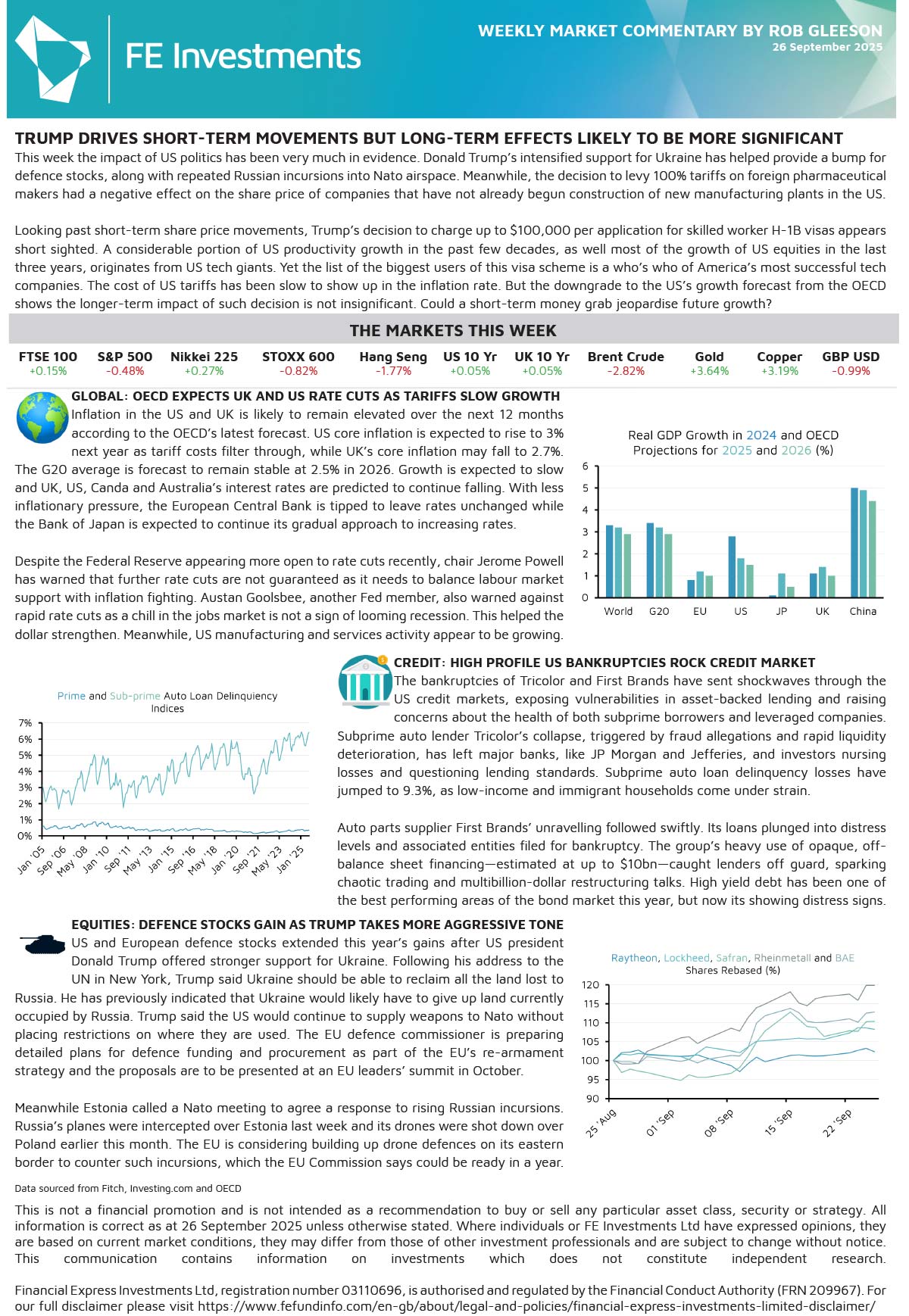-
TRUMP DRIVES SHORT-TERM MOVEMENTS BUT LONG-TERM EFFECTS LIKELY TO BE MORE SIGNIFICANT
Data Sourced from FE Analytics, and Bloomberg Finance LP

TRUMP DRIVES SHORT-TERM MOVEMENTS BUT LONG-TERM EFFECTS LIKELY TO BE MORE SIGNIFICANT
This week the impact of US politics has been very much in evidence. Donald Trump’s intensified support for Ukraine has helped provide a bump for defence stocks, along with repeated Russian incursions into Nato airspace. Meanwhile, the decision to levy 100% tariffs on foreign pharmaceutical makers had a negative effect on the share price of companies that have not already begun construction of new manufacturing plants in the US.
Looking past short-term share price movements, Trump’s decision to charge up to $100,000 per application for skilled worker H-1B visas appears short sighted. A considerable portion of US productivity growth in the past few decades, as well most of the growth of US equities in the last three years, originates from US tech giants. Yet the list of the biggest users of this visa scheme is a who’s who of America’s most successful tech companies. The cost of US tariffs has been slow to show up in the inflation rate. But the downgrade to the US’s growth forecast from the OECD shows the longer-term impact of such decision is not insignificant. Could a short-term money grab jeopardise future growth?
GLOBAL: OECD EXPECTS UK AND US RATE CUTS AS TARIFFS SLOW GROWTH
Inflation in the US and UK is likely to remain elevated over the next 12 months according to the OECD’s latest forecast. US core inflation is expected to rise to 3% next year as tariff costs filter through, while UK’s core inflation may fall to 2.7%. The G20 average is forecast to remain stable at 2.5% in 2026. Growth is expected to slow and UK, US, Canda and Australia’s interest rates are predicted to continue falling. With less inflationary pressure, the European Central Bank is tipped to leave rates unchanged while the Bank of Japan is expected to continue its gradual approach to increasing rates.
Despite the Federal Reserve appearing more open to rate cuts recently, chair Jerome Powell has warned that further rate cuts are not guaranteed as it needs to balance labour market support with inflation fighting. Austan Goolsbee, another Fed member, also warned against rapid rate cuts as a chill in the jobs market is not a sign of looming recession. This helped the dollar strengthen. Meanwhile, US manufacturing and services activity appear to be growing.
CREDIT: HIGH PROFILE US BANKRUPTCIES ROCK CREDIT MARKET
The bankruptcies of Tricolor and First Brands have sent shockwaves through the US credit markets, exposing vulnerabilities in asset-backed lending and raising concerns about the health of both subprime borrowers and leveraged companies. Subprime auto lender Tricolor’s collapse, triggered by fraud allegations and rapid liquidity deterioration, has left major banks, like JP Morgan and Jefferies, and investors nursing losses and questioning lending standards. Subprime auto loan delinquency losses have jumped to 9.3%, as low-income and immigrant households come under strain.
Auto parts supplier First Brands’ unravelling followed swiftly. Its loans plunged into distress levels and associated entities filed for bankruptcy. The group’s heavy use of opaque, off-balance sheet financing—estimated at up to $10bn—caught lenders off guard, sparking chaotic trading and multibillion-dollar restructuring talks. High yield debt has been one of the best performing areas of the bond market this year, but now its showing distress signs.
EQUITIES: DEFENCE STOCKS GAIN AS TRUMP TAKES MORE AGGRESSIVE TONE
US and European defence stocks extended this year’s gains after US president Donald Trump offered stronger support for Ukraine. Following his address to the UN in New York, Trump said Ukraine should be able to reclaim all the land lost to Russia. He has previously indicated that Ukraine would likely have to give up land currently occupied by Russia. Trump said the US would continue to supply weapons to Nato without placing restrictions on where they are used. The EU defence commissioner is preparing detailed plans for defence funding and procurement as part of the EU’s re-armament strategy and the proposals are to be presented at an EU leaders’ summit in October.
Meanwhile Estonia called a Nato meeting to agree a response to rising Russian incursions. Russia’s planes were intercepted over Estonia last week and its drones were shot down over Poland earlier this month. The EU is considering building up drone defences on its eastern border to counter such incursions, which the EU Commission says could be ready in a year.
For more information regarding our weekly market reports, we encourage you to give us a call on 01732 746188 or send us an email at enquiries@foxgroveassociates.co.uk.
This document has been prepared for general information only. It does not contain all of the information which an investor may require in order to make an investment decision. If you are unsure whether this is a suitable investment you should speak to your financial adviser. This information is not guaranteed to be correct, complete, or accurate. Financial Express Investments Ltd, registration number 03110696, is authorised and regulated by the Financial Conduct Authority (FRN 209967). For our full disclaimer please visit https://www.fefundinfo.com/en-gb/about/legal-and-policies/.